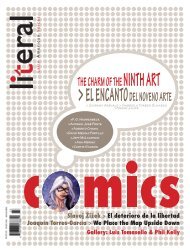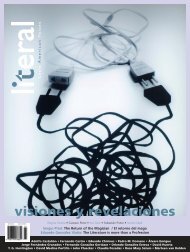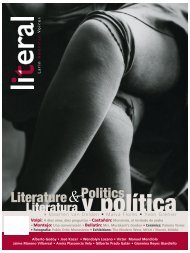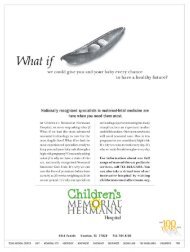Richard Serra - Literal
Richard Serra - Literal
Richard Serra - Literal
You also want an ePaper? Increase the reach of your titles
YUMPU automatically turns print PDFs into web optimized ePapers that Google loves.
old ideology, which he exposes in speeches around the<br />
world. As José Arcadio Buendía played the alchemist<br />
in his laboratory, Chávez plays the revolutionary on TV.<br />
(Yet, unlike José Arcadio Buendía, he was able to fi nd<br />
gold: a black muddy gold, which translates into more<br />
than 13 billion dollars yearly in oil revenues.)<br />
Although today’s socialism has been a reiterating<br />
idea of his almost ten year regime in the country, it became<br />
the international slogan of his revolution on January<br />
30, 2005, during a speech to the 5th World Social<br />
Forum. There, he tried to distinguish the new century’s<br />
socialism from 20th century socialism, claiming that<br />
it was more pluralistic and less state-centered—or at<br />
least that it was different from the Soviet Union’s state<br />
socialism and Cuba’s communism. A year and a half<br />
later, during the Linking Alternatives II Conference<br />
in Vienna, Chávez vaguely defi ned this ideology as<br />
“based on solidarity, on fraternity, on love, on justice,<br />
on liberty, and on equality”. Presto, the scaffoldings<br />
48 4 L ITERAL. LATIN AMERICAN VOICES • FALL, 2007<br />
for an inconsistent system of government were built.<br />
Everything in this new socialism is jargon. In a wordby-word<br />
analysis of his defi nition we see that there is<br />
nothing new about it:<br />
1. Liberty, equality and fraternity: Although Chávez<br />
doesn’t use the words in this order, it’s clear that he<br />
refers to the 18th century’s French Revolution slogan.<br />
The French motto has fascinated Venezuelan politicians<br />
since the country’s independence from Spain.<br />
The phrase has become a historical cliché, and thus<br />
bears no real meaning in the speech.<br />
2. Solidarity: The term alludes to Chávez’s Latin<br />
American foreign policy. Since 2005 Venezuela has<br />
promised about 5.5 billion dollars to socialist countries<br />
around the region in donations, loans and bond purchases.<br />
Solidarity isn’t a new strategy; Venezuela has<br />
always been supportive to other countries, because<br />
it has the privilege to be among the region’s richest<br />
lands. In fact, it was among the few countries standing<br />
at Argentina’s side in the 1982 Falklands War. Also,<br />
in 1986 during the Sandinistas crisis, this country met<br />
with Mexico, Colombia and Panama to prevent a war<br />
between Nicaragua and El Salvador. Today that solidarity<br />
sounds like cash: because Venezuelan riches reproduce<br />
at a fast rate, Chávez is able to support every<br />
leftist entrepreneur around the region; without realizing<br />
that it isn’t his speech what seduces them, but the<br />
sound Venezuelan money makes.<br />
3. Love: The odd word choice of “love” is tacky and<br />
has no real meaning. How are we supposed to interpret<br />
such abstraction? It is evidence of Chávez’s assimilation<br />
of the liberation theology, an early 1970s Catholic leftist<br />
movement, which claimed poverty to be a “social sin”<br />
and capitalism a transgression. Although Chávez never<br />
points specifi cally to this movement, he has repeatedly<br />
declared that Jesus Christ is “the greatest socialist in<br />
history” and that his “Sermon on the Mount” is parallel<br />
with leftist ideals in the same terms the liberation<br />
theory’s priests have done it in the past. The idea of<br />
a Christian and socialist “love” is another populist bureaucratese<br />
which is useful to allure masses in Venezuela,<br />
a country where more than 96 percent of the population<br />
has been baptized. However, it’s in confl ict with<br />
Karl Marx’s Communist Manifesto—the left’s Bible, and<br />
a source repeatedly quoted by the president—where<br />
religion is called “the opium of the people”.<br />
4. Justice: Social Justice has become the paramount<br />
ideal of Chávez’s government in Venezuela. In<br />
fact, his huge public funding of social initiatives is the<br />
main cause for his popularity in the country and in the<br />
rest of the region. Due to its strong oil revenues, the<br />
Venezuelan state is able to promote social programs in<br />
the country’s slums and shantytowns. But the Bolivarian<br />
Revolution—the ideological name Chávez’s followers<br />
give to his government—did not introduce the idea<br />
of social justice; it’s at the very core of socialism—a






